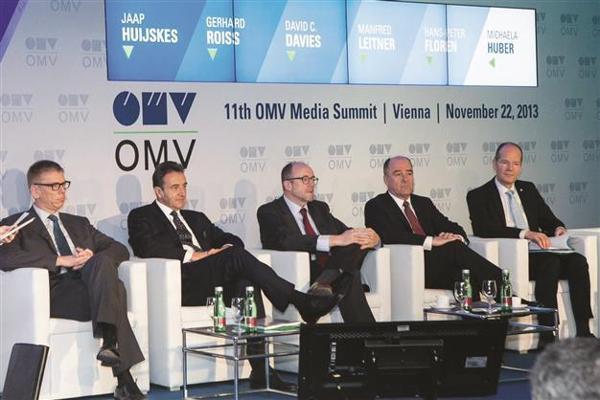Turkey ‘key energy hub’ for OMV due to potential
Güneş Kömürcüler VIENNA – Hürriyet Daily News


OMV CEO and Chairman Gerhard Roiss (2nd L) attends the 11th OMV European Media Summit with the OMV board. Company photo
Turkey is an important energy hub for Austrian energy giant OMV, and the country plays a crucial role in OMV’s plans thanks to its huge growth potential and domestic energy demand, OMV CEO and Chairman Gerhard Roiss said at a company media summit Nov. 22.“We plan to meet the energy demands of at least 200 million customers by 2021 and Turkey is the key to us here,” he said at the end of his presentation, while displaying a picture of Istanbul’s Bosphorus Bridge.
“To address the basics of our growth strategy, I picked up this photo from Istanbul, as a sign of its being a connection between Asian and European markets and its huge growth potential,” he said. The company launched its new corporate strategy a couple years ago, shifting away from being only a downstream company toward being an integrated upstream company. This means that OMV, Austria’s biggest company and one of the biggest European energy companies with revenues of around 44 billion euros, has set a goal of becoming an integrated oil and gas exploration and drilling company that has very rich retail experience.
“This, however, doesn’t mean we have been quitting our downstream business. We have grown mainly on downstream, by establishing filling stations for around the last 25-30 years. Now it is time for us to integrate the two businesses successfully. Our aim is to use our equity gas, which is explored and drilled by us, as much as possible,” he said, adding that 2013 was a decisive year in taking important steps to reach this goal.
OMV is using its rich retail experiences on the matter, he said. The company controls 97 percent of Turkey’s leading fuel products distribution and lubricants company, Petrol Ofisi, with over 2,300 filling stations, and over 1 million cubic meters of storage capacity. OMV also has a 51 percent share of Romania’s state energy producer, Petrom.
“We plan to position our strong brands, like Petrol Ofisi and Petrom, as the regional powers,” Roiss said.
Less risky regions
“Our business is highly risky, and we should consider political risks as much as possible when setting our strategies. These two core areas offer great potential for the oil and gas business, and they are much less risky than many others,” Roiss said.
OMV said the production level in 2013 was now expected to be somewhat below the level of 2012 as interruptions in Libya and Yemen, an earlier-than-planned temporary shutdown of the Maari field in New Zealand, as well as a water influx in a key producing well in Austria, impacted production at the beginning of November.
“Libya constitutes around 10 percent of our total production. And we hope for some recovery next year, then to reach some 100,000 barrels per day by 2016,” said the company CFO and deputy chairman of the board, David C. Davies.
He said OMV usually produces around 32,000 barrels of oil per day in Libya and that the firm was losing that much in production for each day production remains shut down for a couple of weeks. The company mainly focuses on two main areas in its upstream business, the North Sea and the Black Sea.
OMV reached very rich hydrocarbon deposits off 320 kilometers north of Norway’s coast last October while also announcing its biggest acquisition to date, a $2.65 billion deal to buy stakes in North Sea oilfields owned by Norway’s Statoil.
It is also searching for hydrocarbon sources in the deep waters off Romania in the Black Sea with Exxon Mobil and in northern Iraq with Genel Energy, among others.
Meanwhile, Roiss said “We are trying to enhance Europe’s gas security. We would have liked to have done this via Turkey by the Nabucco project if we had been accepted.” He added that Nabucco had never been a main strategy for the company to reach this goal. “We are not a pipeline company. Our aim is to find and develop our own gas, our equity gas and to meet Europe’s gas demand,” he said.
OMV secures its gas supply mainly through long-term contracts with Statoil and Gazprom, but the share of its own sources have been rising. The company secured 5 bcm of its gas supply by its own sources in 2012 and 7 bcm via long-term contracts.
